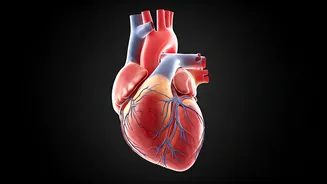Chest Discomfort Explained
One of the primary early warning signs of heart disease is chest discomfort. The cardiovascular research scientist noted that this discomfort could manifest
in various ways, ranging from a dull ache to intense pressure or squeezing in the chest area. This feeling isn't always sharp pain; sometimes, it might feel like a fullness or a heavy sensation. It is crucial to pay close attention to any unusual sensations in your chest. These sensations could occur during physical exertion, emotional stress, or even at rest. If you experience such discomfort, especially if it's accompanied by other symptoms like shortness of breath, dizziness, or nausea, seeking immediate medical attention is highly advisable. Ignoring chest discomfort could lead to delayed diagnosis and treatment, increasing the risk of serious complications.
Breathing Difficulties Unveiled
Shortness of breath, even during minimal activity, is another early warning sign of heart disease. It occurs because the heart may not be efficiently pumping blood, leading to a build-up of fluid in the lungs. The cardiovascular research scientist explained that this symptom often starts subtly. Initially, you might experience breathlessness while climbing stairs or during a brisk walk. However, as the condition progresses, shortness of breath may occur even during everyday tasks, or when you are at rest. The breathlessness might feel like you can't get enough air or like your chest is tight. This symptom should not be ignored, especially if it is accompanied by other symptoms like chest pain, swelling in the ankles or feet, or fatigue. Consulting a healthcare professional promptly can help determine the underlying cause and ensure the best course of action.
Unusual Fatigue Demystified
Persistent and unusual fatigue is another significant indicator. The cardiovascular research scientist highlighted that this isn't just regular tiredness; it's an overwhelming exhaustion that doesn't improve with rest. You may feel drained and unable to perform daily tasks effectively. This fatigue stems from the heart's inability to adequately supply the body with oxygen-rich blood. This makes the body's systems work harder than they should, leading to feeling constantly tired. This fatigue could be accompanied by other symptoms, such as weakness, lightheadedness, and difficulty concentrating. Persistent fatigue, especially coupled with other symptoms like chest discomfort or shortness of breath, requires medical evaluation. Early identification and management of these signs can significantly improve heart health and overall well-being. It is recommended to maintain a healthy lifestyle.













